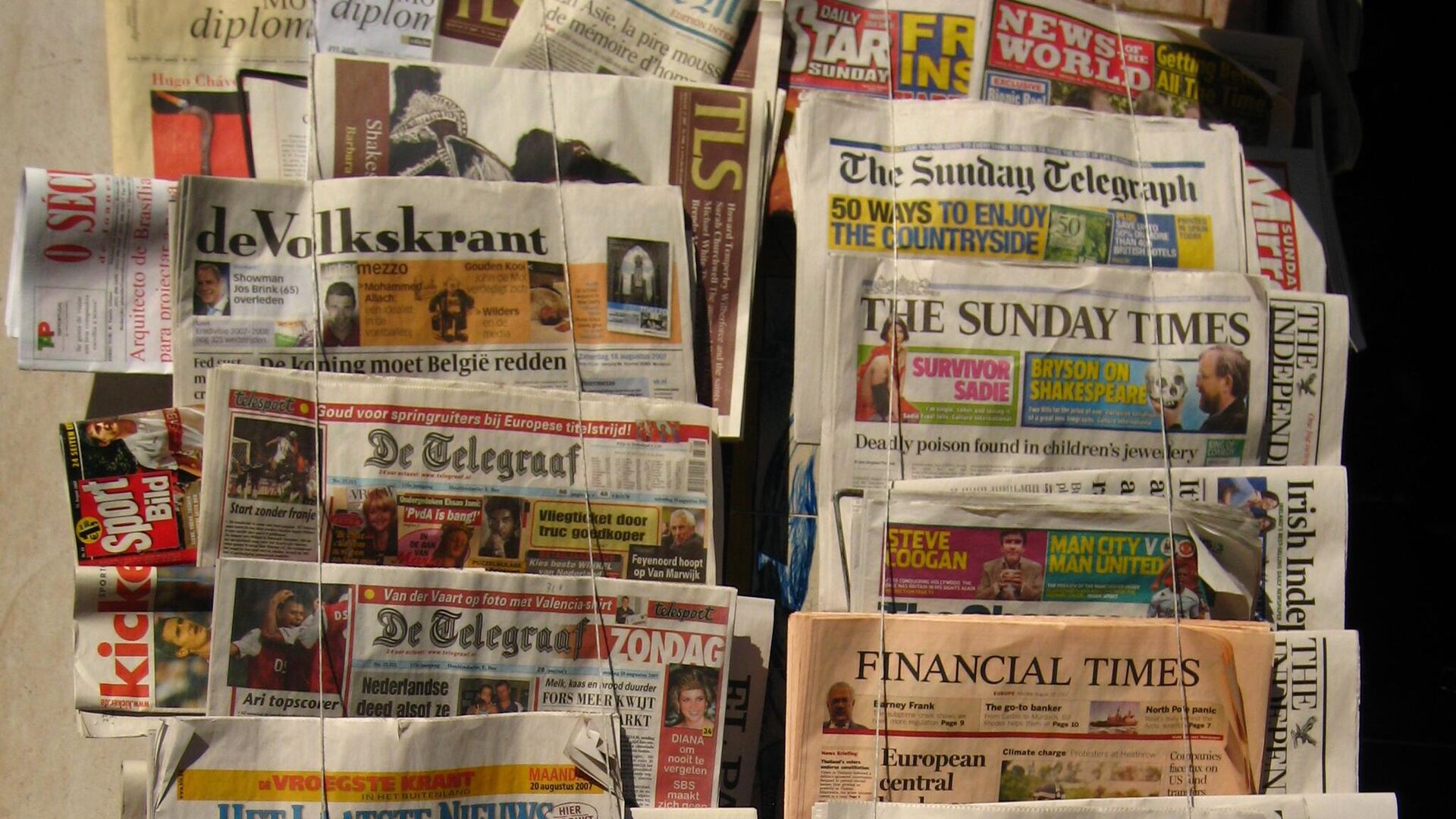https://sputnikglobe.com/20220505/just-one-in-six-uk-reporters-have-working-class-roots-report-reveals-1095290837.html
Just One in Six UK Reporters Have Working-Class Roots, Report Reveals
Just One in Six UK Reporters Have Working-Class Roots, Report Reveals
Sputnik International
Journalism is one of the lowest-paid white-collar jobs in Britain, with salaries for a reporter at major national newspapers based in London well under £30,000... 05.05.2022, Sputnik International
2022-05-05T17:08+0000
2022-05-05T17:08+0000
2023-05-28T15:19+0000
britain
great britain
journalism
working class
middle class
united kingdom (uk)
https://cdn1.img.sputnikglobe.com/img/07e6/05/05/1095292538_0:0:2048:1153_1920x0_80_0_0_75333e4506bf684530e67f30ee7b1f0f.jpg
Five out of every six British reporters come from wealthy families — according to a new report into the fourth estate.The National Council for the Training of Journalists (NCTJ) 'Diversity in Journalism' report found that 84 per cent of reporters were from upper-class or professional backgrounds.That figure was lower among editors — most of whom will have entered the profession a decade or more ago — with 27 per cent of them coming from working-class families.NCTJ research consultant and report author Mark Spilsbury suggested that the falling number of working-class scribblers could be down to employers preferring university graduates over old-fashioned trainee cub reporters. A 2019 report found that only one in 20 university students are from low-income white families.Mike Hill, director of the MA News Journalism course at Cardiff University, told Wednesday's press conference for the report's release that the barriers for young working-class entrants into the newsprint business were even higher than when he got into the profession 30-odd years ago."Rather than this being an inspirational tale, it’s also a cautionary one. There are lots of things that have happened between me in the late 1980s and 1990s becoming a journalist and now that means I wouldn’t make it currently," he added."My local library is shut, my old school is in special measures, there isn’t the funding from employers to send people on training courses, people are spooked by the £10,000 figure to pay for postgraduate journalism training," Hill stressed."Then there’s the lack of cash, there being no network — I didn’t know anyone who went to university let alone who was a journalist — and then there’s the imposter syndrome," he said, referring to the crisis of self-confidence often felt by outsiders in a profession.Journalism is also one of the worst-paid white-collar jobs in Britain, with salaries for a reporter at major national newspapers based in London well under £30,000 a year — barely enough to live in the capital without parental aid. School-leavers can earn far more in the blue-collar trades like construction, plumbing or electrics without amassing tens of thousands in debt from student loans.The report found that the representation of ethnic minorities in the sector had reached 13 per cent — on a par with national demographics — while 47 per cent of journalists were women, reflecting the proportion in the workforce as a whole.A surprising statistic was that the number of Britain's 32.2 million workforce describing their trade as 'journalism' had grown to around 108,000 — despite a fall in advertising income during the COVID-19 pandemic. That was up from 73,000 in the 2016 Labour Force Survey.Spilsbury said that figure did not mean newspapers and magazines were hiring more staff, but rather indicated a rise in outsourced content-writing and more "journalism-adjacent" roles.
https://sputnikglobe.com/20220423/gonzalo-lira-case-why-does-us-keep-silent-on-ukrainian-spooks-intimidating-american-journo-1094996973.html
britain
great britain
united kingdom (uk)
Sputnik International
feedback@sputniknews.com
+74956456601
MIA „Rossiya Segodnya“
2022
James Tweedie
https://cdn1.img.sputnikglobe.com/img/07e4/08/1c/1080307270_0:3:397:400_100x100_80_0_0_7777393b9b18802f2e3c5eaa9cbcc612.png
James Tweedie
https://cdn1.img.sputnikglobe.com/img/07e4/08/1c/1080307270_0:3:397:400_100x100_80_0_0_7777393b9b18802f2e3c5eaa9cbcc612.png
News
en_EN
Sputnik International
feedback@sputniknews.com
+74956456601
MIA „Rossiya Segodnya“
Sputnik International
feedback@sputniknews.com
+74956456601
MIA „Rossiya Segodnya“
James Tweedie
https://cdn1.img.sputnikglobe.com/img/07e4/08/1c/1080307270_0:3:397:400_100x100_80_0_0_7777393b9b18802f2e3c5eaa9cbcc612.png
britain, great britain, journalism, working class, middle class, united kingdom (uk)
britain, great britain, journalism, working class, middle class, united kingdom (uk)
Just One in Six UK Reporters Have Working-Class Roots, Report Reveals
17:08 GMT 05.05.2022 (Updated: 15:19 GMT 28.05.2023) Journalism is one of the lowest-paid white-collar jobs in Britain, with salaries for a reporter at major national newspapers based in London well under £30,000 a year. School-leavers can earn far more in the blue-collar trades like construction, plumbing or electrics without amassing tens of thousands in debt from student loans.
Five out of every six British reporters come from wealthy families — according to a new report into the fourth estate.
The National Council for the Training of Journalists (NCTJ)
'Diversity in Journalism' report found that 84 per cent of
reporters were from upper-class or professional backgrounds.
That figure was lower among
editors — most of whom will have entered the profession a decade or more ago — with 27 per cent of them coming from working-class families.
NCTJ research consultant and report author Mark Spilsbury suggested that the falling number of working-class scribblers could be down to employers preferring university graduates over old-fashioned trainee cub reporters. A 2019 report found that only one in 20 university students are from low-income white families.
Mike Hill, director of the MA News Journalism course at Cardiff University, told Wednesday's press conference for the report's release that the barriers for young working-class entrants into the newsprint business were even higher than when he got into the profession 30-odd years ago.
"Becoming a journalist to me was akin to getting onto the space programme," Hill said, as quoted by the Press Gazette. "My dad was a miner, which when I tell that to my students now it’s a bit like saying he was a blacksmith or a thatcher."
"Rather than this being an inspirational tale, it’s also a cautionary one. There are lots of things that have happened between me in the late 1980s and 1990s becoming a journalist and now that means I wouldn’t make it currently," he added.
"My local library is shut, my old school is in special measures, there isn’t the funding from employers to send people on training courses, people are spooked by the £10,000 figure to pay for postgraduate journalism training," Hill stressed.
"Then there’s the lack of cash, there being no network — I didn’t know anyone who went to university let alone who was a journalist — and then there’s the imposter syndrome," he said, referring to the crisis of self-confidence often felt by outsiders in a profession.
Journalism is also one of the worst-paid white-collar jobs in Britain, with salaries for a reporter at major national newspapers based in London well under £30,000 a year — barely enough to live in the capital without parental aid. School-leavers can earn far more in the blue-collar trades like construction, plumbing or electrics without amassing tens of thousands in debt from student loans.
The report found that the representation of ethnic minorities in the sector had reached 13 per cent — on a par with national demographics — while 47 per cent of journalists were women, reflecting the proportion in the workforce as a whole.
A surprising statistic was that the number of Britain's 32.2 million workforce describing their trade as 'journalism' had grown to around 108,000 — despite a fall in advertising income during the COVID-19 pandemic. That was up from 73,000 in the 2016 Labour Force Survey.
Spilsbury said that figure did not mean newspapers and magazines were hiring more staff, but rather indicated a rise in outsourced content-writing and more "journalism-adjacent" roles.



